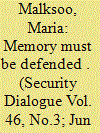| Srl | Item |
| 1 |
ID:
183520


|
|
|
|
|
| Summary/Abstract |
This study focuses on the policy response of the Abe government (2012–present) to UNESCO’s inscription of the ‘Documents of Nanjing Massacre’ to argue that the historical revisionists’ perspective is central to the thinking of Japan’s UNESCO diplomacy. The UNESCO’s inscription heightened a sense of shame from the viewpoint of Japanese historical revisionists, leading the Japanese government to the unprecedented step of using its economic power to reform UNESCO’s Memory of the World programme and to prevent further inscription of historical documents that go against the view of the government. Because UNESCO constitutes the existing biographical narrative of Japan as a peace-loving, law-abiding country, the Japanese government remains careful to maintain a good-will posture to UNESCO. This article highlights the case of Japan to illustrate the importance of memory and identity change, as well as of the distinction between ontological security and the removal of threat to a historical narrative.
|
|
|
|
|
|
|
|
|
|
|
|
|
|
|
|
| 2 |
ID:
139412


|
|
|
|
|
| Summary/Abstract |
This article supplements and extends the ontological security theory in International Relations (IR) by conceptualizing the notion of mnemonical security. It engages critically the securitization of memory as a means of making certain historical remembrances secure by delegitimizing or outright criminalizing others. The securitization of historical memory by means of law tends to reproduce a sense of insecurity among the contesters of the ‘memory’ in question. To move beyond the politics of mnemonical security, two lines of action are outlined: (i) the ‘desecuritization’ of social remembrance in order to allow for its repoliticization, and (ii) the rethinking of the self–other relations in mnemonic conflicts. A radically democratic, agonistic politics of memory is called for that would avoid the knee-jerk reactive treatment of identity, memory and history as problems of security. Rather than trying to secure the unsecurable, a genuinely agonistic mnemonic pluralism would enable different interpretations of the past to be questioned, in place of pre-defining national or regional positions on legitimate remembrance in ontological security terms.
|
|
|
|
|
|
|
|
|
|
|
|
|
|
|
|